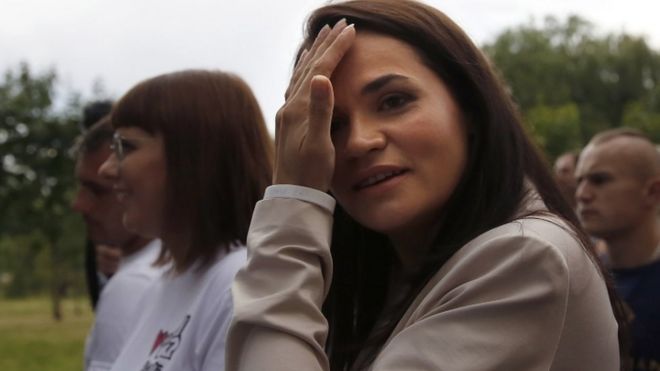Opposition leader Svetlana Tikhanovskaya has left Belarus and is "safe" in Lithuania, Lithuanian Foreign Minister Linas Linkevicius says.
Ms Tikhanovskaya's departure came as protests went on for a second day over Sunday's disputed presidential poll.
Her campaign team said she was avoiding the protests because of "possible provocations".
Election results gave President Alexander Lukashenko 80%, but Ms Tikhanovskaya refuses to accept them.
A lack of scrutiny, with no observers present, has led to allegations of widespread vote-rigging in the poll. The US and EU have condemned the vote.
Mr Lukashenko, in power since 1994, has described opposition supporters as "sheep" controlled from abroad.
On Monday evening police in Belarus's capital Minsk fired rubber bullets to quash protests, and officials say one demonstrator died when an explosive device went off in his hands - the first confirmed fatality since the clashes began.
How did we get here?
Mr Linkevicius tweeted about Ms Tikhanovskaya's whereabouts on Tuesday morning after rumours that she had disappeared.
There had been concern for her on Monday but her campaign later said she was "safe", without saying where.
Mr Linkevicius told Lithuanian radio she had been detained for seven hours in Belarus but did not say why or by whom.
The election campaign saw the rise of Ms Tikhanovskaya, 37, a former teacher who was a stay-at-home mother until she was thrust into the political spotlight.
After her husband was arrested and blocked from registering for the vote, she stepped in to take his place.
President Lukashenko has dismissed Ms Tikhanovskaya as a "poor little girl", manipulated by foreign "puppet masters".
After the vote took place, her campaign said the results, which gave her just 9.9% of the vote, "did not correspond to reality" and vowed to challenge "numerous falsifications".
Ms Tikhanovskaya told reporters that she had in fact won the election, and called on the authorities to relinquish power peacefully. Protests began as soon as polls closed and continued for a second night on Monday.
However, Mr Lukashenko said he would respond robustly to the protests and not allow the country to be torn apart.
A symbol of change, not a leader
Svetlana Tikhanovskaya went missing after lodging an official complaint about the election result. She was quoted saying "I've made my decision" but nobody could confirm her whereabouts for many hours.
Now the foreign minister of neighbouring Lithuania says she's there - and safe. How that happened isn't clear yet.
On Monday, the KGB security service in Belarus claimed it foiled a plot to assassinate the opposition candidate - and make her a "sacrificial lamb", for protesters. At a news conference in Minsk, she seemed nervous, slightly unsure; the same day - she told the BBC she was scared.
The fact Svetlana Tikhanovskaya has fled, though, won't affect the unprecedented mass protests that have rocked Belarus for a second night - crowds clashing with riot police.
They're organised through social media - mainly Telegram - not by her campaign team and the candidate hadn't joined them in person. She only ran for president after her activist husband was arrested - and for voters, Svetlana Tikhanovskaya has always been a symbol of change, a route to that, rather than a leader.
What happened in Monday's protests?
Riot police fired rubber bullets, tear gas and stun grenades to disperse thousands of demonstrators rallying in the capital.
Polish-based broadcaster Belsat TV aired footage of the police charging into the crowds.
Reports say some of the demonstrators fought back, throwing petrol bombs. Protesters also tried to build barricades.
A number of people were arrested. One journalist was injured, her colleagues and eyewitnesses said.
Later on Monday, the interior ministry said a protester died when he "tried to throw an unidentified explosive device at members of law enforcement".
"It exploded in his hand," the ministry said in a statement.
Protests were also being held in other Belarusian cities.
The internet, which was "significantly disrupted" on election day, continued to be mostly unavailable for a second day, according to online monitor NetBlocks.
What has the international reaction been?
Russian President Vladimir Putin congratulated his Belarusian counterpart on his victory, despite friction over accusations of a Russian plot, which Mr Lukashenko has tried to link to the opposition.
The leaders of China and several former Soviet nations have sent messages of support.
But the US said it was "deeply concerned" by the election and urged the government to "respect the right to peacefully assemble and to refrain from the use of force".
European Commission President Ursula von der Leyen called for the election results to be published, saying harassment and repression had no place in Europe.
Individual EU countries expressed support for the demonstrators, and neighbouring Ukraine's President Volodymyr Zelensky said doubts over the election were "a direct road to violence, conflict and growing public outcry".
What's the context?
President Lukashenko, 65, was first elected in 1994.
In the last vote in 2015, he was declared winner with 83.5% of the vote. There were no serious challengers and election observers reported problems in the counting and tabulation of votes.
Anger towards Mr Lukashenko's government this time has been in part fuelled by its response to coronavirus.
The president has downplayed the outbreak, advising citizens to drink vodka and use saunas to fight the disease.
Belarus, which has a population of 9.5 million, has reported nearly 70,000 cases and almost 600 deaths.
Source : BBC





